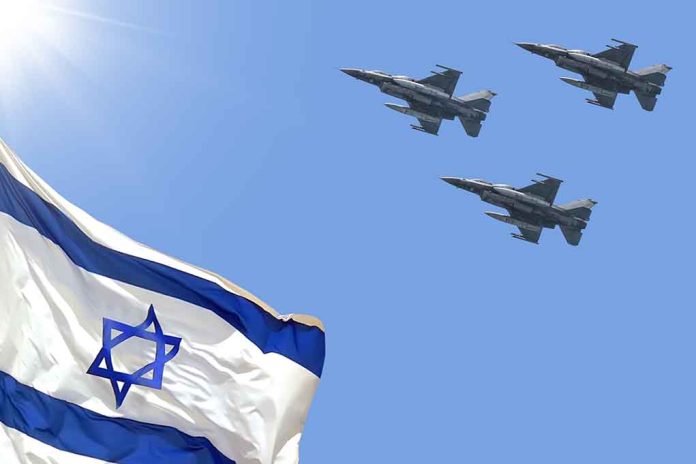
Iran’s Revolutionary Guards Commander Hossein Salami was killed in a massive Israeli airstrike that targeted multiple Iranian military and nuclear facilities, dramatically escalating the long-simmering conflict between the two regional powers.
Key Takeaways
- Major General Hossein Salami, commander of Iran’s Islamic Revolutionary Guard Corps (IRGC), was reportedly killed in Israeli airstrikes along with other high-ranking Iranian officials
- Dozens of Israeli aircraft conducted strikes on Iranian military targets and nuclear sites as part of “Operation Rising Lion”
- Multiple Iranian nuclear scientists, including Dr. Fereydoun Abbasi and his family, were reportedly assassinated in the attack
- Israel has declared a “special state of emergency,” while the U.S. maintains it was not involved in the strikes
- The targeted strikes appear aimed at disrupting Iran’s nuclear program and military capabilities, with uncertain consequences for regional stability
Massive Israeli Offensive Targets Iranian Leadership
Israeli forces launched a coordinated attack on Iranian military installations and nuclear facilities early Friday morning, reportedly killing several high-ranking Iranian officials. The operation, dubbed “Rising Lion,” involved dozens of Israeli aircraft striking multiple targets across Iran. According to Iranian state media, IRGC Commander Major General Hossein Salami was among those killed in what represents one of the most significant direct confrontations between Israel and Iran in recent history.
Local Iranian news agencies Tasnim and Mehr reported Salami’s death, referring to him as “martyred” in the Israeli attack. IRGC Major General Gholam Ali Rashid was also reportedly killed in the strikes. The Jerusalem Post reported that numerous other significant figures were targeted, including prominent nuclear scientists essential to Iran’s nuclear program, dramatically escalating tensions in an already volatile region.
🚨🇮🇱🇮🇷 BREAKING: TOP IRGC COMMANDERS, NUCLEAR CHIEF KILLED IN ISRAELI STRIKES ON TEHRAN
Iranian state media reports that IRGC Commander-in-Chief Hossein Salami, former Atomic Energy chief Fereydoon Abbasi-Davani, and Khatam-al Anbiya Central HQ Commander Major General Gholam Ali… https://t.co/2U6IcgAGAT pic.twitter.com/Vf2IIkvglC
— Mario Nawfal (@MarioNawfal) June 13, 2025
Nuclear Program Targeted
“Dozens of Israeli aircraft participated in an initial wave of strikes on dozens of military targets and Iranian nuclear sites early on Friday morning,” reported Yonah Jeremy Bob and Jerusalem Post Staff from The Jerusalem Post.
The strikes appear to have specifically targeted key figures in Iran’s nuclear program. Dr. Fereydoun Abbasi, a prominent nuclear scientist, along with his wife and child, were reportedly assassinated. Additionally, Dr. Abdulhamid Minouchehr, a dean at Shahid Beheshti University, and Professor Ahmadreza Zolfaghari from the same institution were killed in the attack. These targeted assassinations suggest Israel’s intent to disrupt Iran’s nuclear capabilities by eliminating scientific leadership.
While Iranian state media have claimed civilian casualties, including children, these reports remain unverified. The Israeli Defense Forces stated that the strikes were specifically designed to prevent Iran from obtaining a nuclear weapon, reflecting Israel’s long-standing position that it will not allow Iran to develop nuclear weapons capabilities that could threaten its security.
U.S. Position and Regional Implications
“Tonight, Israel took unilateral action against Iran. We are not involved in strikes against Iran and our top priority is protecting American forces in the region,” stated U.S. Secretary of State Marco Rubio from Newsweek.
Israeli Defense Minister Israel Katz has declared “a special state of emergency” following the strikes, preparing for potential retaliation. The U.S. Embassy in Baghdad was reportedly preparing for evacuation of non-essential personnel due to security concerns, highlighting the regional implications of this dramatic escalation. Meanwhile, President Trump has emphasized a commitment to diplomatic resolution of the Iranian nuclear issue.
Uncertain Aftermath
The elimination of Salami represents a significant blow to Iran’s military leadership structure. As commander of the IRGC, he was one of the most powerful figures in Iran’s military and political establishment. His death, if confirmed, would create a major leadership vacuum within the organization that serves as the backbone of the Iranian regime’s defense apparatus and its operations throughout the Middle East.
“Israel advised us that they believe this action was necessary for its self-defense. President Trump and the Administration have taken all necessary steps to protect our forces and remain in close contact with our regional partners. Let me be clear: Iran should not target U.S. interests or personnel,” added Secretary Rubio from Newsweek.
The scale and precision of these attacks indicate a sophisticated Israeli intelligence and military operation, potentially informed by years of surveillance and preparation. How Iran will respond remains unclear, but the elimination of such high-ranking officials will undoubtedly prompt significant retaliation. The region now stands at a precarious crossroads, with the potential for a wider conflict that could draw in other regional powers and affect global stability.



